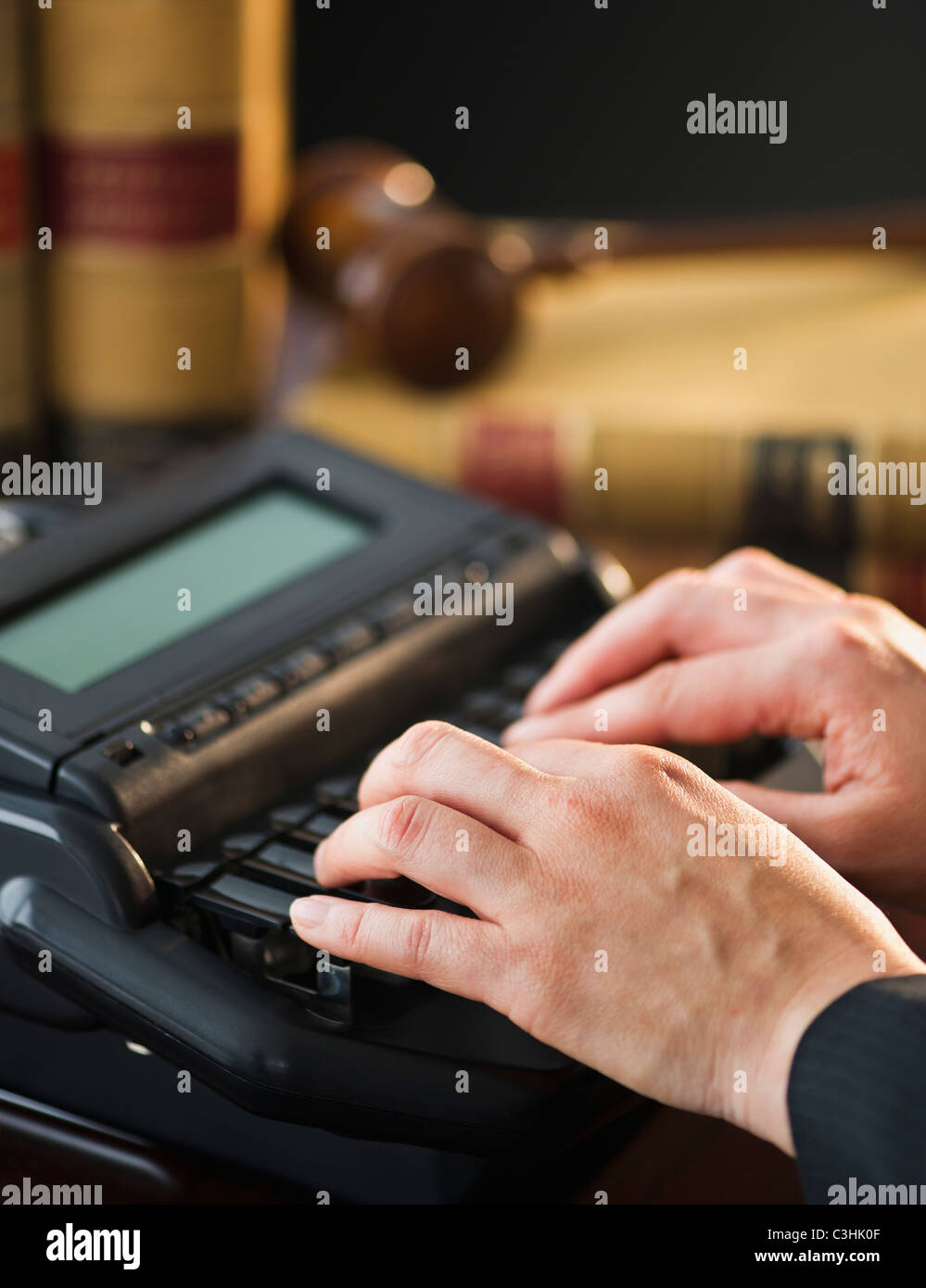The Role of a Court Typist in Major Trials
The Role of a Court Typist in Major Trials
Blog Article
Discover the Necessary Skills and Duties of a Court Typist in Today's Lawful Landscape
As a court typist, you hold an important setting in the legal system. Your abilities surpass simply typing; they entail understanding complex legal terms and treatments while guaranteeing accuracy in every paper. You collaborate carefully with courts and lawyers, making your function vital for efficient communication. What specific skills do you require, and how can you adapt to the ever-evolving technical landscape? Allow's explore this further.
The Function of a Court Typist in the Judicial System
As the backbone of the judicial system, a court typist plays an important function in guaranteeing that legal procedures are precisely recorded. You're responsible for transcribing whatever from witness testaments to judges' judgments, catching every detail with precision. Your job assists maintain a clear and permanent document of court tasks, which is critical for future reference and appeals.In the court, you're often the unhonored hero, silently assuring that all spoken words come to be written documents. You maintain privacy, understanding the sensitive nature of lawful matters. You additionally team up carefully with courts, staffs, and lawyers to assure the smooth circulation of information. By functioning effectively under pressure, you add to the total performance of the judicial process. Your interest to detail and dedication to precision not just copyright the integrity of the court yet also support the more comprehensive search of justice in culture.
Vital Skills Needed for Court Typists
Court typists need an unique mix of abilities to stand out in their important function within the judicial system. You have to have superb inputting skills, usually attaining speeds of 70 words per min or more. Precision is important; also a small error can bring about significant misconceptions in legal records. You'll additionally require strong attention to detail, making sure every word is transcribed correctly.Additionally, great business skills are vital for handling numerous instances and documents effectively. Being tech-savvy is vital, as you'll utilize numerous software programs for word processing and file administration. Strong communication skills assist you engage with courts, attorneys, and other court workers effectively.Lastly, a feeling of professionalism and trust and privacy is a must, as you'll deal with delicate details daily. By honing these abilities, you'll be well-prepared to contribute significantly to the court setting.
Understanding Lawful Terms and Treatments
As a court typist, you need to realize crucial lawful terms and treatments to execute your task successfully. Recognizing these principles not only assists you record properly but likewise guarantees you can comply with the circulation of court process. Allow's explore the essential legal vocabulary and an overview of court processes you need to recognize.

Trick Legal Terms
Recognizing key lawful terms is crucial for any individual operating in a court room setting. You'll regularly run into terms like "plaintiff," which refers to the individual initiating a claim, and "accused," who replies to the claims. Understanding the difference between "civil" and "criminal" instances aids you understand the context of the proceedings. Knowledge with "subpoena" assurances you understand the legal documents compelling witnesses to testify. Additionally, terms like "proof" and "testimony" are vital, as they connect directly to the info provided in court. Grasping these terms not just enhances your performance as a court typist yet also ensures that you contribute to the precision and clarity of legal papers. Your function hinges on accurate terms, so don't take it gently!
Court Procedures Overview
Familiarity with essential legal terms sets the phase for grasping court treatments. Understanding just how a courtroom functions is crucial for any kind of court typist. You'll run into procedures like accusations, where defendants hear costs, and activities, which are demands for a court judgment. Acquaint on your own with the roles of lawyers, courts, and clerks, as each plays a crucial component in process. Understanding the circulation of a trial-- from jury choice to closing debates-- helps you properly capture the procedures - court typist. In addition, comprehending the value of maintaining a impartial and accurate record can't be overemphasized. By understanding these elements, you'll boost your effectiveness in documenting necessary court tasks and contribute significantly to the lawful procedure. Your role is vital in maintaining the honesty of court documents
The Impact of Technology on Court Keying In
Modern technology's changed court keying in substantial means. With digital transcription devices, you can boost efficiency and accuracy, making your job easier than ever before. Plus, remote court process have changed how you approach your job, needing versatility to new layouts and innovations.
Digital Transcription Devices
As digital transcription devices proceed to advance, they're changing the method court typists perform their responsibilities. These devices enhance the transcription process, permitting you to catch talked words precisely and efficiently. With voice acknowledgment software application, you can try here record real-time process, minimizing hands-on input and minimizing errors.Moreover, cloud-based platforms enable very easy access to records, so you can work collaboratively with lawful groups and guarantee everybody's on the same page. Automated formatting attributes save you time on recurring jobs, letting you focus on content quality.Additionally, digital devices enhance safety and security, securing sensitive info via encrypted storage space and controlled gain access to. By embracing these modern technologies, you can enhance your performance and maintain the high criteria needed in the lawful field.
Remote Court Procedures
The surge of remote court procedures has actually considerably changed the landscape for court typists. You now rely upon modern technology to record and record online hearings from your office or home. Knowledge with video clip conferencing platforms is essential, as you'll require to browse them seamlessly to ensure an exact record. You'll likewise need to manage audio quality, as background sound or link concerns can disrupt your job. Additionally, remote procedures require fast reasoning; you may need to clarify statements or demand repeats in real-time. Remaining organized and efficient is important, as deadlines remain tight. Embracing these technological innovations not only enhances your skills but also ensures you continue to be an important possession in today's advancing legal environment.
Accuracy and Focus to Information in Transcription
Precision and interest to detail are important in transcription, specifically for court typists. court typist. When you're recording lawful process, every word counts. A single blunder can alter the definition of a declaration, possibly impacting the result of a situation. You need to listen carefully, guaranteeing that you record every subtlety and inflection in the speaker's voice.Your ability to catch typos and grammatical mistakes is essential. You don't just kind; you verify that the final document is an exact representation of what was said in court. This calls for an eager eye and an extensive understanding of legal terminology.Moreover, you'll require to be acquainted with different accents and talking designs, as court rooms can hold a variety of speakers. By developing your precision and interest to information, you'll keep the honesty of legal records and contribute noticeably to the judicial procedure. Your diligence around truly makes a distinction

Time Monitoring and Business Abilities
While taking care of multiple jobs, reliable time administration and business skills are crucial for court typists. You'll often manage various deadlines, from recording court procedures to preparing legal documents. Prioritizing your work is vital; determine urgent jobs and tackle them first to assure timely submissions.Organizational abilities enter into play when you're arranging with case notes, transcripts, and documents. Keeping whatever nicely classified not only conserves time but also minimizes the threat of error. Using devices like calendars, to-do lists, or specialized software program can help you remain on track and manage your time effectively.Moreover, establishing specific objectives for each job session can improve your productivity. Damage bigger projects you can look here right into smaller tasks to make them a lot more manageable. By honing these abilities, you'll not just improve your efficiency but also add significantly to the smooth procedure of the legal procedure, guaranteeing whatever runs like clockwork.
Proceeding Education and Professional Advancement Opportunities
Spending in your skills doesn't quit with time management and company. As a court typist, you'll find that proceeding education and specialist advancement are necessary to remaining competitive in the legal area. Look for workshops or on the internet training courses concentrating on innovative keying methods, legal terms, and transcription software application. These can develop your skills and help you adapt to the most up to date technologies.Networking is just as essential. Join expert organizations like the National Court Reporters Organization (NCRA) or regional legal organizations. They usually provide sources, training sessions, and meetings that can enhance your understanding and link you with peers.Don' t ignore certification programs that can enhance your credibility and bankability. Staying updated with the most recent trends and best techniques in lawful documentation will boost your performance and precision, making you an invaluable possession to any type of legal group. Invest in your development, and you'll enjoy the benefits throughout your profession.
Often Asked Concerns
What Is the Common Salary Range for a Court Typist?
A court typist's regular income varieties from $30,000 to $55,000 yearly, depending on experience and area. You may also locate chances for growth with added abilities, leading to raised pay in the legal field.

Are Court Typists Required to Have a Lawful Level?
Court typists do not need a lawful level, however having one can be helpful. You'll usually locate that strong keying abilities and understanding of legal terms are more vital for success in this role.
What Are the Work Hours for a Court Typist?

Exactly How Do Court Typists Make Sure Privacy in Their Work?
You ensure discretion by securely dealing with sensitive documents, browse around these guys making use of encrypted software, and complying with strict procedures. You remain knowledgeable about personal privacy laws and only share information with authorized employees, maintaining trust in the judicial procedure.
Can Court Typists Job From Another Location or Freelance?
Yes, you can function from another location or freelance as a court typist, particularly if you have dependable technology and a protected environment. Numerous attorneys now embrace remote work, offering adaptability and chances for independent typists. As the backbone of the judicial system, a court typist plays a vital function in guaranteeing that legal proceedings are properly recorded. As a court typist, you need to comprehend vital lawful terms and procedures to perform your job successfully. Grasping these terms not only improves your effectiveness as a court typist yet also ensures that you contribute to the accuracy and clarity of legal papers. The increase of remote court process has actually substantially changed the landscape for court typists. As a court typist, you'll discover that continuing education and expert development are crucial to remaining competitive in the lawful area.
Report this page